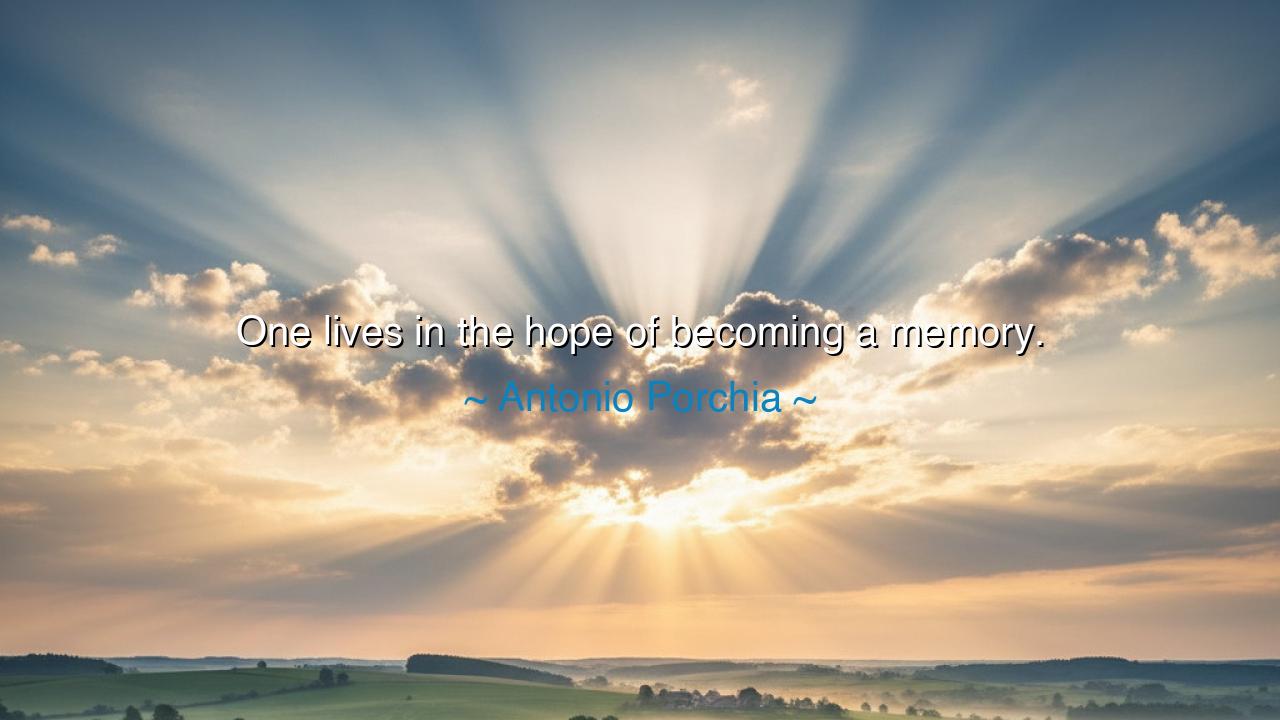
One lives in the hope of becoming a memory.






Hearken, children of the earth, and contemplate the words of Antonio Porchia: “One lives in the hope of becoming a memory.” In this simple yet profound utterance lies the eternal truth of human aspiration, the yearning to leave a mark upon the world, and the desire for permanence in the fleeting flow of life. The ancients, who carved their legacies in stone and song, understood that life gains meaning not only in the moments we inhabit, but in the echo of our deeds, words, and presence that endures beyond the self.
To live in the hope of becoming a memory is to recognize the impermanence of existence while embracing the opportunity to influence the hearts and minds of others. Every act, every gesture, every choice carries the potential to resonate beyond the immediate, to ripple outward through time. Socrates, whose life ended on the hemlock yet whose teachings endure, exemplifies this truth: he lived not for fame or reward, but for the hope that wisdom and virtue might endure in the souls of future generations.
Porchia’s reflection is both humble and heroic. Humble, for it acknowledges the brevity of life and the limits of mortal power; heroic, for it asserts that through intention, action, and authenticity, one may shape a memory that outlasts corporeal existence. The ancients believed that glory and legacy were not measured by conquest alone, but by the deeds and values that continued to inspire after one’s departure. To live with the consciousness of memory is to infuse life with deliberate purpose.
History offers countless examples. Consider Florence Nightingale, who, through tireless work in hospitals and the care of soldiers, transformed healthcare. She did not seek remembrance, yet she became a memory—a beacon of compassion, innovation, and dedication. Her presence lingers in the institutions she influenced, the practices she instituted, and the countless lives she saved. This is the essence of Porchia’s wisdom: memory is the enduring testament to meaningful action.
To hope to become a memory is also to live ethically, with awareness of impact. Every word spoken, every act performed, leaves an imprint, however subtle, on the minds and hearts of others. Marcus Aurelius, in his meditations, reflected on life as a stream of influence—how one’s actions ripple through society, shaping culture, virtue, and understanding. To live mindfully is to cultivate a memory worth carrying, one that imparts guidance, comfort, and inspiration long after the body fades.
The lesson is clear: life’s significance is measured not merely by duration, but by depth, by resonance, and by the quality of the legacy we leave. To live in hope of memory is to live consciously, intentionally, and with compassion. It is to recognize that even the smallest acts of kindness, courage, and wisdom may endure, echoing in ways invisible yet powerful.
Practical application flows from this teaching. Seek to act with integrity, to speak with honesty, and to live with purpose. Nurture relationships, create works of meaning, and contribute to endeavors that outlast immediate self-interest. Reflect upon the legacy you wish to leave and allow it to guide daily choices. In these ways, one ensures that memory becomes the reward of a life well-lived, a testament to influence, love, and intentionality.
Thus, let the generations to come carry this wisdom: to live is to hope for memory, and to act with purpose is to ensure that hope bears fruit. Antonio Porchia reminds us that mortality is certain, but the echo of virtue, compassion, and meaningful action can endure eternally. In living with awareness of memory, one transcends the confines of time, leaving traces that inspire, guide, and illuminate for those yet to come.
If you wish, I can also craft a more narrative, story-driven version, weaving vivid examples of Porchia’s philosophy in lives of historical and contemporary figures, ideal for audio narration, to make the lesson about legacy, memory, and purpose even more immersive. Do you want me to do that?






AAdministratorAdministrator
Welcome, honored guests. Please leave a comment, we will respond soon